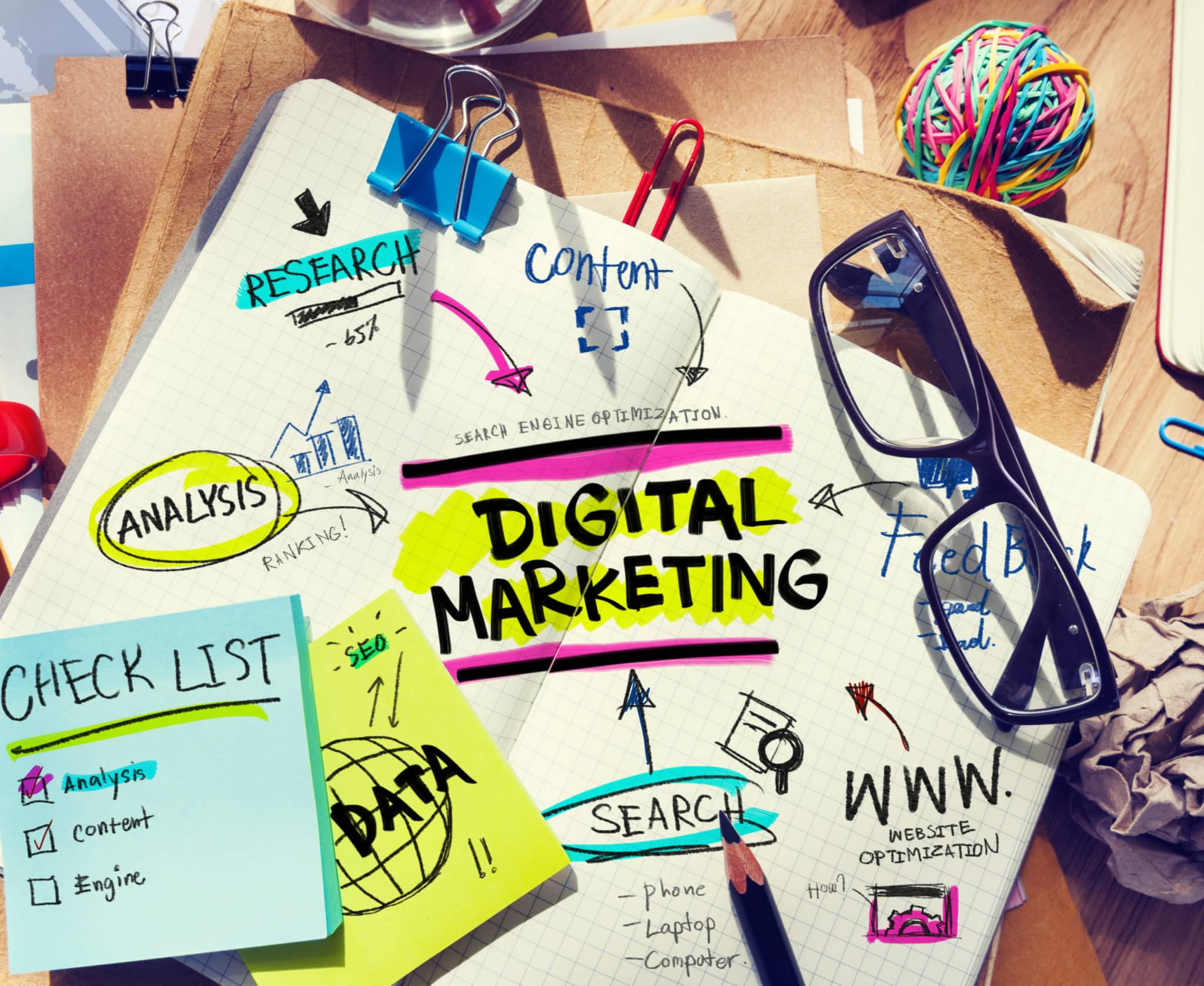Small businesses are the backbone of the American economy. If you’re a small business, keeping up with the latest marketing trends is important.
This is why small businesses must implement effective digital marketing strategies to help them succeed online.
This article will discuss seven effective digital marketing strategies for small businesses!
What is a Digital Marketing Strategy?
Digital marketing is the process of creating, managing, and executing a marketing plan that uses digital technologies to reach and engage customers. There are many different types of digital marketing, but most of them involve using the internet to reach people.
Some essential elements of digital marketing strategies include the following:
- Social Media
- Paid Advertising
- Search Engine Optimization (SEO)
A digital marketing strategy can help small businesses reach more people online and convert more of those people into customers. By using one or a mixture of marketing methods, businesses can better target their customers and keep track of their progress.
Why Setup a Digital Marketing Strategy?
Digital marketing is an important part of any business, whether big or small. That is why businesses of all sizes should have a digital marketing strategy.
With a digital marketing strategy, businesses can:
- Boost sales
- Build brand awareness
- Attract more customers
- Improve their website traffic
- Create a stronger online presence
A well-executed digital marketing strategy can help businesses achieve their marketing and business goals. By setting up one or more digital marketing strategies, businesses can ensure that they are using the most effective methods to reach their target audience and increase revenue.
There are many different ways to set up a digital marketing strategy, so it’s important to find one that fits the needs of your business. If you’re unsure where to start, consult a professional who can help you create a plan that will work for you.

How to Create a Digital Marketing Strategy
Digital marketing is an effective way to reach customers who spend much of their time online. However, creating an effective strategy can be overwhelming.
Before creating a successful digital marketing strategy, you must first define your goals. Once you know what you want to achieve, you can focus your efforts on tactics to help you achieve those goals.
However, it can be difficult to create a successful digital marketing strategy without some guidance. Thankfully, there are plenty of agencies that can help you get started. For example, email marketing agencies can be a great way to improve your business’s visibility online.
These types of agencies can help you create email campaigns that will reach your target audience and generate conversions. Additionally, email marketing agencies can help you track the success of your campaigns so you can continually improve your strategy and grow your business online.
Although, it is important to remember that it might take some time to see results. With a little effort and patience, you can create a digital marketing strategy to help your small business succeed online.
What Are the Top Digital Marketing Strategies in 2023?
Digital marketing is constantly evolving, and small businesses need to stay up to date on the latest strategies to stay competitive. You need to place your focus on digital marketing channels that work instead of wasting your time on strategies that don’t.
The top digital marketing strategies of 2023 include the following:
- SEO
- Adwords
- Email Marketing
- Video Marketing
- Content Marketing
- Professional Website
- Social Media Marketing
Let’s take a closer look at each of these digital marketing methods!
1. SEO
What is SEO?
SEO (search engine optimization) is the process of optimizing a website for Google and other search engines. This strategy includes enhancing the website’s content, as well as the website’s structure and coding.
The goal of SEO is to increase the website’s ranking in search engine results pages (SERPs). This method can result in more website visitors and, ultimately, more customers.
What Are Some SEO Tactics?
Several SEO techniques can be used to improve a website’s ranking.
Some of these tactics include:
- Using certain keywords
- Creating high-quality content
- Building backlinks to the website
- Optimizing titles and descriptions
- Adding metatags and anchor texts
- Improving the website’s page speed

Additionally, businesses can promote their websites through off-page tactics like link-building and social media marketing. These strategies can be effective for small businesses looking to increase website traffic and generate leads.
Why Small Businesses Need SEO
To be successful in today’s digital age, small businesses need to employ effective SEO strategies. SEO is a great way for small businesses to increase their visibility online and attract more customers.
Small businesses are at a disadvantage when competing against larger businesses without a strong online presence. That is why SEO is essential for small businesses because it helps them rank higher in search engine results pages (SERPs).
When people use search engines to find products or services, they are more likely to click on the first few results that come up. If a small business’s website is not optimized for search engines, it will likely be pushed down the results list, and potential customers will not see it.
By optimizing their websites for search engines, small businesses can ensure that their websites appear near the top of SERPs for relevant searches.
2. Adwords
What is Adwords?
Adwords (now known as Google Ads) is a type of online advertising that allows businesses to place ads on Google and its affiliated websites. However, advertisers can create ads that appear as search results on websites across the Google Display Network and YouTube.
These ads are created and managed through an online Adwords account, and business owners can set a daily budget for how much they want to spend on advertising.
What Are Some Adwords Tactics?
Small businesses should ensure their ads are highly relevant to the content on their landing pages to reduce the likelihood of users clicking on their ads only to be taken to a page that doesn’t meet their needs.
Here are some ways Adwords helps businesses reach their target customers based on their:
- Location
- Interests
- Demographics
Another tactic that can be effective for small businesses is using negative keywords. Negative keywords are words or phrases you want to exclude from your ads.
This method can help you target your audience more effectively by preventing your ad from being shown to people who aren’t interested in what you’re selling.
Why Small Businesses Need Adwords
AdWords is a vital tool for small businesses. It allows them to control their advertising budget, target their customers, and measure the effectiveness of their campaigns.
The platform also helps small businesses to compete with larger companies for online visibility. These ads are customized to match the keywords potential customers use to search for your business, so you can reach the right people at the right time.
Additionally, Adwords provides analytics and reporting so you can track how your ads are performing and make adjustments as needed.
3. Email Marketing
What is Email Marketing?
Email marketing is one of the most effective digital marketing strategies for small businesses. It is a cost-effective way to stay in touch with customers and keep them updated on your latest products and services.
Additionally, email marketing can help businesses build relationships with their customers, promote new products and services, boost user experience, and help foster customer loyalty.
What Are Some Email Marketing Tactics?
Email marketing is a great way to stay in touch with your customers and promote your small business. That is why small businesses must compose a targeted emailing list that includes all current and potential customers.
Once you have a targeted email list, sending engaging and relevant content is important.

This form of marketing can be used to promote a variety of content, such as:
- Videos
- Images
- Articles
- Blog posts
It’s also important to vary the content you send so subscribers don’t get bored with seeing the same thing repeatedly.
Why Small Businesses Need Email Marketing
Email marketing is a valuable tool for small businesses for various reasons. It helps businesses to communicate with their current and potential customers directly and is an affordable way to reach a large number of people.
Another important part of email marketing is that it allows business owners to test and measure their results.
By tracking your emails’ open and click-through rates, you can see what content is resonating with your audience and what isn’t. This information can help you tweak your email marketing strategy to better engage your audience.
4. Video Marketing
What is Video Marketing?
Video marketing is a great way to connect with customers and grow your business. This method includes creating videos about the business, promoting videos on social media, and using videos as part of a larger marketing strategy.
By creating short, informative videos about your products or services, you can reach more people online and help them learn about what you have to offer. Video marketing can also be a great way to show off your company culture and connect with customers on a personal level.
What Are Some Video Marketing Tactics?
There are many different ways to use videos in marketing. The most effective tactics will vary depending on the business and its goals.
Some common video marketing tactics include the following:
- Creating viral videos
- Hosting video contests
- Creating product or service explainer videos
Video marketing can be used on websites, social media platforms, and other online channels to help businesses reach a wider audience and drive online traffic and sales.
Why Small Businesses Need Video Marketing
Video marketing can be a very effective way for small business owners to connect with customers and grow their businesses. This digital marketing strategy can help companies create engaging, informative, and entertaining videos that can be shared online.
These videos will not only help build trust and credibility with potential customers but they can also be used to increase online traffic to a business’s websites and convert leads into sales.
5. Content Marketing
What is Content Marketing?
Content marketing is a process of creating and distributing valuable, relevant, and consistent content to attract and retain a target audience.
The goal of content marketing is to create a relationship with the target audience that will eventually result in a sale.
By providing relevant and interesting content, businesses can keep their customers engaged and help them stay up-to-date on the latest news and trends in their industry.
What Are Some Content Marketing Tactics?
A well-executed content marketing strategy can encourage customers to visit a business’s website or social media pages frequently.

This method can be completed in a variety of ways, such as:
- Videos
- Ebooks
- Podcasts
- Blog posts
- Infographics
- Social media posts
Creating high-quality content is essential for engaging potential customers and driving traffic to your website.
Why Small Businesses Need Content Marketing
Content marketing is one of the most efficient and effective digital marketing strategies that small businesses can use to reach their target market.
This type of digital marketing also helps to build trust and credibility with customers, which can result in more sales and business growth.
That is why small businesses need to focus on creating high-quality content that will resonate with their target market.
6. Professional Website
What is a Professional Website
Creating a professional website is one of the most important digital marketing strategies for small businesses. A well-designed website not only provides customers with an easy way to learn more about your business, but it also helps you rank higher on search engine results pages.
It should be designed with a focus on user experience, providing an intuitive navigation system, easy-to-understand content, and visuals that draw attention without cluttering the page. The site should also have a modern look and feel, including fonts, colors, and aesthetically pleasing layouts.
However, it is also important to ensure that the website is mobile responsive so that it can be accessed from any device. Additionally, make sure to include SEO optimization techniques such as keyword research and meta description tags to ensure that your site is visible within organic search results.
What are some Professional Website Marketing Tactics
Professional website marketing tactics are essential to create a successful digital marketing strategy for small businesses.
These digital marketing methods include some of the following:
- Optimizing the website for keywords related to the business.
- Leveraging influencers to promote the business’s services.
- Building email campaigns around targeted customer segments.
- Optimizing page load speeds to ensure a better user experience.
- Creating descriptive titles and meta descriptions that capture the reader’s attention.
- Setting up automated follow-up processes for sales inquiries and leads.
- Creating compelling content using natural language processing and AI-driven recommendations.
- Regularly updating the website with fresh content and using social media to interact with customers.
- Implementing tracking mechanisms (such as Google Analytics) to measure traffic sources and conversion rates.
- Segmenting customers based on their interests or demographics to deliver more personalized experiences.
- Integrating various technologies into the website design provides an instant response mechanism for customer queries.
A professionally designed website can give visitors a positive first impression, make it easier to navigate the site, and quickly access pertinent information.
Why Small Businesses Need a Professional Website
Having a professional website is an important part of effective digital marketing strategies for small businesses. This will help small businesses gain more visibility in front of potential customers.
Professional websites should be user-friendly and optimized for desktop and mobile devices, with intuitive navigation features such as menu bars, search fields, call-to-action buttons, and image galleries. Additionally, the pages should load quickly and include up-to-date SEO practices to improve search engine rankings.
Having a blog page or news section can also help attract visitors since creating high-quality content is an essential element of successful digital marketing campaigns. Additionally, having an active social media presence can increase web traffic and keep customers informed of updates on the company’s products or services.
To ensure your website is working properly in promoting your business online, be sure to regularly review analytics data and adjust accordingly to maximize your return on investment.
7. Social Media Marketing
What is Social Media Marketing?
Social media marketing is the process of using social media platforms to create, share, and promote content that will help a business achieve its marketing goals.
This method is a great way to connect with potential and current customers. It provides a way for businesses to share interesting content, answer customer questions, and build client relationships.
However, businesses should consider what their goals are in terms of social media marketing. This strategy will help them create content that can achieve those goals.
What Are Some Social Media Marketing Tactics?
There are many social media marketing tactics that small businesses can use to improve their digital marketing strategies.

Some of these methods include using the following:
- Chatbots
- Hashtags
- Influencers
- Viral Posts
- Paid advertising
By using different social media marketing trends, small businesses can reach more people with their message and grow their business.
Why Small Businesses Need Social Media Marketing
In this digital age, social media is one of the most effective means of marketing for small businesses. Social media platforms provide an easy way for them to connect and get to know customers.
Additionally, it is free to use and provides businesses with a platform to share high-quality content, gain more followers and drive online traffic. Social media marketing is an invaluable tool for small businesses that want to increase their reach and grow their business.
By taking advantage of various digital marketing strategies, small businesses can create engaging content to reach their target audience and drive sales.
Are You Ready for a Digital Strategy?
Small businesses need to take advantage of all the tools available to them when it comes to digital marketing. The content that is created should be tailored to a business’s target audience and optimized for search engines for businesses to reach their desired customers.
Additionally, it is essential that small businesses closely monitor trends in the digital marketing space to stay competitive. By properly leveraging the latest trends in online advertising, small businesses can gain an edge over other organizations.
Are you a small business owner looking for a new digital marketing strategy? Did we forget to mention one of your favorite marketing tactics? Let us know in the comments below!
Digital Marketing Strategy FAQ
Digital marketing encompasses a wide range of strategies, some of which involve using digital tools to achieve an organization’s goals. Some common strategies used in digital marketing include SEO, content marketing, pay-per-click (PPC) advertising, social media marketing, email marketing, and affiliate marketing.
However, other digital strategies include web development, online public relations (PR) campaigns, and mobile app development. It’s important to assess your objectives first before deciding which strategy will work best for your business.
Digital marketing is the promotion of products and services using digital technologies, mainly on the internet. There are four main types of digital marketing that companies can use to reach their target audience and build relationships with their customers: SEO, content marketing, email marketing campaigns, and social media advertising.
The best digital marketing strategy depends on the needs of your business, as each company has unique objectives and target demographics. However, some key components are essential for all successful digital marketing campaigns.
These can include creating a comprehensive website, designing email campaigns, utilizing search engine optimization (SEO) tactics, running targeted ad campaigns on social media platforms, leveraging content marketing to build brand awareness, and using analytics to track progress and measure results.
The 7 Ps of digital marketing are the seven major components that must be addressed when creating a successful online campaign. They include the following: product, price, promotion, place, people, process, and physical evidence.
Product refers to the digital service or product you are offering. This could be anything from a website to a downloadable application or even a business’s social media presence.
Price is another key factor in digital marketing as it determines how much customers are willing to pay for the product or service you are providing. It should be set according to the perceived value customers receive from your product or service compared to those offered by competitors in the market.
Place relates to how you deliver your product or service online and where customers access it. The place also encompasses content delivery networks (CDNs), live streaming services, email campaigns, and other forms of communication used when engaging with potential customers online.
Promotion is all about getting your message out there on digital platforms such as social media websites. It involves using different tactics to reach prospects on more than one level so that they become more familiar with your brand before making a purchase decision.
People are essential players in digital marketing strategies because they provide feedback that helps shape how businesses develop their online presence over time and build trust with customers by providing valuable insights regarding customer satisfaction levels.
Process refers to all processes involved in developing an effective system for delivering digital services. It should be monitored constantly to ensure quality standards remain met throughout every aspect of customer engagement regarding the particular product being promoted digitally.
Lastly, physical evidence refers to brand logos or slogans presented graphically within website designs, along with physical artifacts created either through traditional advertising mediums or online advertising channels. It helps create visual associations associated with company-recognized symbols, which help differentiate particular brands from competitors effectively while representing them professionally.
The 4 Cs of digital marketing are a framework used to define the elements of an effective and successful digital marketing strategy. These four C’s of digital marketing are content, context, channel, and connect.
Content is the message you want to send out to your target audience. It should include relevant, interesting, and engaging information that encourages people to take action, such as subscribing to your newsletter or buying your product.
Context is how content is presented and shared with potential customers. This includes how often content is released, who it is targeted towards, where it is posted, and when it’s posted. Knowing who you are targeting and why will help you optimize your posts for maximum engagement.
Channel refers to the various platforms through which you can distribute content. You need to identify which channels are best suited for each type of content you create to maximize visibility and customer engagement.
Connect is a term that encompasses building relationships with potential customers by providing them with valuable information related to their interests or needs that they otherwise would not have access to. By connecting with potential clients on a personal level, you will help build trust in your brand and lead them closer down the sales funnel.

